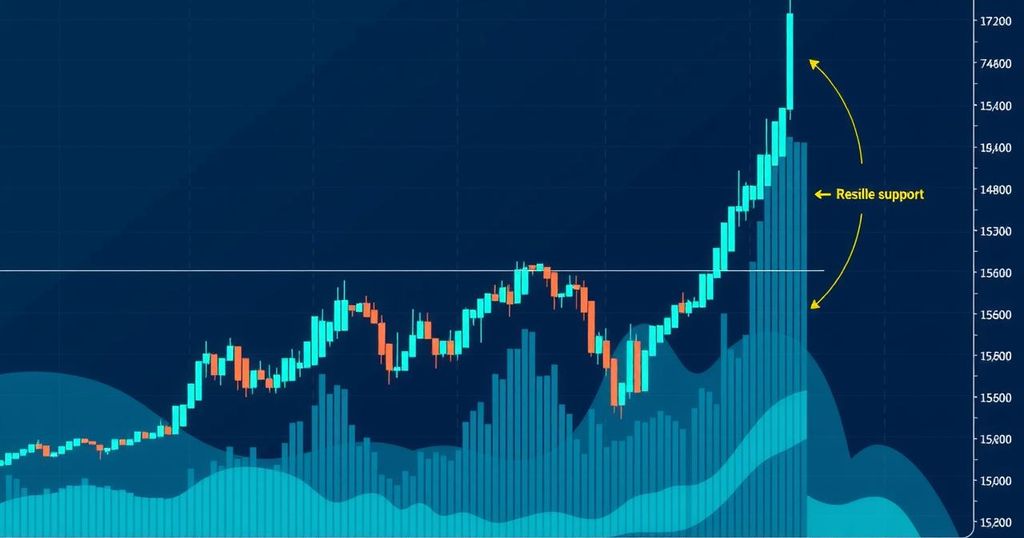Bitcoin Market Cap Stays Strong at $1.9 Trillion Amid Price Fluctuations
Bitcoin maintains a market capitalization of $1.9 trillion despite minor price fluctuations, currently priced at $96,480.10. Significant trading volume and a focus on regulatory developments for stablecoins like Tether highlight changing dynamics in the cryptocurrency market. Technological advancements suggest potential enhancements to Bitcoin’s functionality, making it an area of continued investor interest.
Bitcoin (BTC) is currently experiencing significant price fluctuations, staying priced at $96,480.10, which reflects a minor decline of 0.94% or $911.23 from its prior closing rate. The cryptocurrency has traded between a low of $95,499 and a high of $98,368 today. Despite these movements, Bitcoin’s market capitalization stands strong at an impressive $1.9 trillion, demonstrating its resiliency and dominance within the cryptocurrency ecosystem. The 50-day price average is observed at $84,156.09 while the 200-day average rests at $68,116.04, suggesting a favorable long-term upward trajectory.
Moreover, Bitcoin’s trading volume for the day has notably reached over $151 billion, significantly exceeding the average of approximately $47 billion. This increase in trading activity indicates a growing interest among traders and investors, highlighting the cryptocurrency’s inherent volatility characterized by a year high of $103,900.47 and a year low of $38,521.90, attracting diverse market participants seeking potential gains.
In the broader cryptocurrency ecosystem, Howard Lutnick has emerged as a prominent supporter of Tether, a stablecoin that is pivotal for various trading strategies. The endorsement of Tether is particularly significant given the recent regulatory approval for stablecoins like USDT in Abu Dhabi, which enhances their legitimacy and utility in the financial sector. Furthermore, discussions concerning Bitcoin’s potential as a safeguard against inflation are gaining traction, with Vancouver’s mayor advocating for its adoption to mitigate the risks posed by fiat currency depreciation.
Technologically, Bitcoin is witnessing advancements in programmability, with innovators such as Evan Cheng focused on improving its functionality through object-oriented programming. This progression may revolutionize the deployment of Bitcoin in decentralized applications, enhancing its versatility and appeal. The approval of Tether in key regions such as Abu Dhabi acts as a catalyst for advancing the legitimacy and acceptance of digital assets in traditional finance, heralding a future of broader integration.
The landscape of cryptocurrency remains dynamic, with Bitcoin at the forefront as the most influential digital asset. As it navigates market vicissitudes influenced by economic conditions and political events, understanding its price movements, trading volume shifts, and regulatory developments becomes pivotal. With Bitcoin serving as a potential hedge against inflation and innovations enhancing its features, it remains a focal point for investors and policymakers alike. Furthermore, developments regarding stablecoins such as Tether signify a growing recognition of digital assets within regulated financial frameworks globally.
In summary, Bitcoin demonstrates substantial market robustness, evidenced by its $1.9 trillion market capitalization even amidst price volatility. The heightened trading volume and ongoing technological advancements signal increasing investor interest. Furthermore, the support for stablecoins and discussions of Bitcoin’s role in combating inflation underscore its potential as a valuable asset in the financial landscape. Collectively, these factors contribute to a narrative of sustained growth and innovation within the cryptocurrency realm.
Original Source: tokenist.com








Post Comment